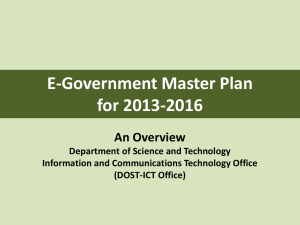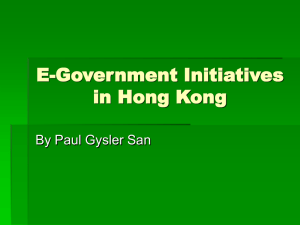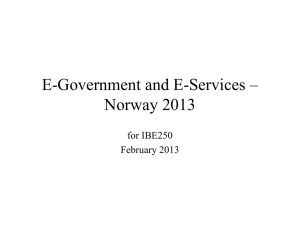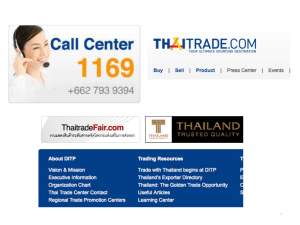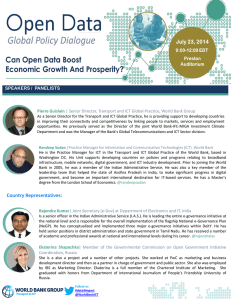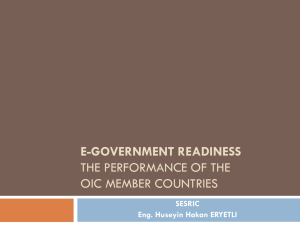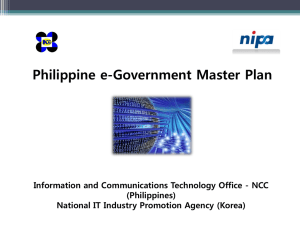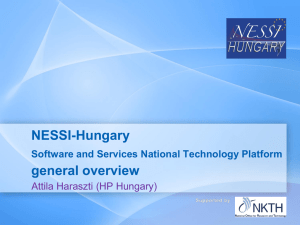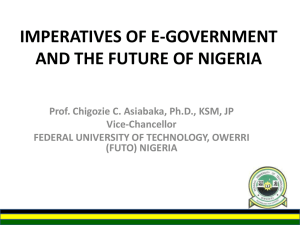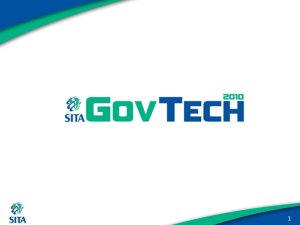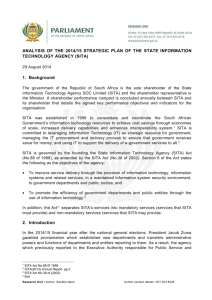eGovernment - The Eastern Cape ICT Summit
advertisement
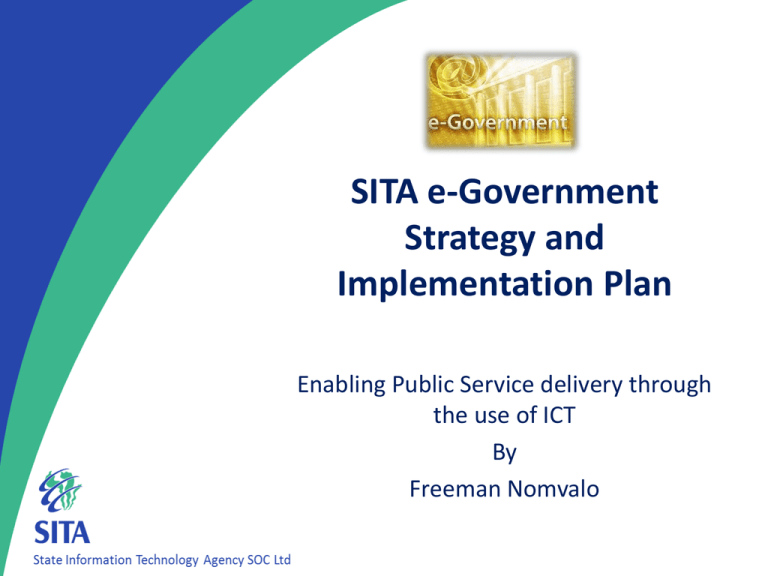
SITA e-Government Strategy and Implementation Plan Enabling Public Service delivery through the use of ICT By Freeman Nomvalo 1 Agenda Introduction SITA E-Government Mandate Historical perspective Lessons learned Strategic roadmap (High level project plan) Change Management Critical Success Factors 2 E-Government shareholder intent Shareholder Goal Make at least 70% of public facing services online accessible to citizens by 2019. Shareholder intent (Budget Vote 2014) “…more focused attention on infrastructure roll-out, the creation and acceleration of the expansion of egovernment services,” as well as “…and develop eGovernment platforms, for use by Departments to deliver services online to citizens. “… the Department will coordinate work with other frontline government departments that provide services to the public. Through SITA , over the next five years, a significant number of government services will be available online.” 1 SITA Act section 6 3 e-Government defined Public Service Act (103 of 1994 as amended 2007) electronic government means the use of ICT in the public service to improve its internal functioning and to render services to the public; International Telecommunications Union (Gant, Jon P. (2008)), e-Government means “the use of information and communication technologies in government to provide public services, to improve managerial effectiveness and to promote democratic values; as well as a regulatory framework that facilitates information intensive initiatives and fosters the knowledge society”. SITA Act (88 of 1998 as amended by Act 38 of 2002) “information technology” means all aspects of technology which are used to manage and support the efficient gathering, processing, storing and dissemination of information as a strategic resource; “information systems” means applications and systems to support the business whilst utilising information technology as an enabler or tool; ‘electronic form’ (e-Form) means a form that can be electronically filled in by means of an electronic device that is able to be interpreted by an ICT system. ‘electronic service’ (e-Service) means a public service that is provided by means of an ICT System. e-Government = G2G + G2B + G2C 4 4 e-Government Domains Government To Citizen (G2C) ICT to enable Citizen convenience and participation e.g. SARS e-Filing, DoL Unemployment Fund submission (UFiling), DHA Identity Tracking , Info Portals (Gateway, Web sites) Government To Government (G2G) ICT to improve internal efficiency and admin of Government e.g. Fin Accounting (BAS), Logistics, HR (PERSAL), Crime Administration (CAS), Population Register (NPR), Social Pension (SOCPEN), Health Admin (HIS, PaaB, Pharm), Education (NSC, ANA), Transport (eNatis) Government To Business (G2B) ICT to serve Private Business, Industry and Trade e.g. CIPC Companies Register, Electronic Payments, SARS Customs 5 SITA Value Proposition to e-Government Benefits Value Proposition •Common e-Government Platform •Integrated ICT Ecosystem •Common Government Master Data Application •Convergence of Transversal Systems (ERP, ECM, etc) •Interactive and collaborative portal •Next Generation Network SITA House Of Values •Common Standards • •GWEA; MISS; MIOS; Security; QuEST; SSIM • Cloud Computing Enablement •IaaS •PaaS •SaaS e-Gov Implementation Legacy System Renewal •Taking government to the citizen •Automating G2C services •Making government accessible and ICT userfriendly •Controlled •No piecemeal development Central Service Management •Single point of control for: •Government ICT development •Citizen ICT related queries • • • • • • Citizen Convenience Increased Productivity Lower Cost Security Interoperability Reduced Duplication Economies of Scale Digital Inclusion 6 SITA e-Government Platform status Stream Milestone Status 1 • Procure e-Forms & Workflow Technology Completed (Adobe Life Cycle and Drupel) • Procure/Install Physical infrastructure (CPU) Completed 2 • Configure/Test E-Forms Technology • Develop e-Forms Completed 41 e-Forms designed 3 • Secure Government buy-In • Implement e-Forms with data validation. DHS & DMV secured. Technical architecture completed; PoC on multi-access channels developed (CSIR) 4 • • • • • • Integration technology Track and trace solution (WASP) Digital Signature Solution Commercial Packaging of e-Forms Payment Module Solution Portal technology Defined, but not procured Tested, but not implemented Not started Not started Not started Not started 5 • Master Data Management technology • Data Governance office Not started Electronic Data Management Framework completed 7 Evolution of e-Government 2000 -2001 2003 2012 2013 Policy & Paper Forms E-Government (Batho Pele) SITA e-Government Initiative E-Gov Enablers • Inventory of paper based forms for Batho Pele Gateway • e-Government Policy by DPSA • Batho Pele Gateway – Static Website providing Information to citizens about Public Services • Batho Pele Call centre launched to support the citizens. • SITA Board approved the SITA e-Government Framework and Initiatives. • E-Forms Technology procured. • E-Forms Platform configured. • Procurement vehicle for Integration technology and Master Data Management identified; • Engagement model to secure government participation defined. • Tender to solicit System Integration Partners from industry published. 8 Fragmented approach to e-Government Separate and Custom e-Government initiatives Decentralised funding Multiple Data Centres Little or poor integration between departments Duplication of efforts and investments Home Affairs SARS Basic Education Western Cape Transport 9 Lessons learned from best practice Dedicated centralised fund for e-Government The implementation Agency needs to be adequately staffed with appropriate skills The Agency must perform Integrated e-Government Planning Development of National ICT Plan (including egovernment); Implementation of all major ICT projects; Monitoring and Evaluation of all ICT projects; Procurement at economies of scale; 10 SITA Integrated e-Government Platform Military Veterans SARS E-Gov Initiative ESB Human Settlement Dept ...n E-Gov Initiative SITA secured e-Government Platform Vehicle to Integrated Government Master Data NEXT GENERATION NETWORK GOVERNANCE Home Affairs HOSTING SITA Government 11 Enhanced Security for e-gov readiness Consolidate the security functions (in SITA) to include physical and logical security that will ensure government data assets are protected from the prevailing Human, Physical and Cyber-Security threats. Implementing modern information security control measures such as the security operations centre, vulnerability management, data leakage protection, and Partnering SSA and SAPO on Government PKI. With Industry, Academia, Veterans(Public Service, Military etc.), to support and deliver on the Security agenda of government. 12 SITA e-government Programme of Action Governance Stream Policy Stream Infrastructure Stream Outreach Stream (e-Service) 13 E-Government Governance Model Mandate E-Government Ministerial Committee (eGov MINCOM) E-Government Executive Committee (eGov EXCOM) E-Government Programme Committee (eGov PCOM) Members To ensure e-Government Policy and Regulatory Portfolio alignment with Government Agenda and MTEF Ministers (DTPS, DPSA, DOC), Chairpersons of eGovernment EXCOM and Broadband Advisor Council To coordinate and secure eGovernment programme commitments across Departments. Chair: DTPS, DPSA, SITA Members: DOC, DHA, DOJ, SARS, SAPS, SAPO, NT, SSA To ensure the implementation of e-Government programme using Internal and Industry Skills Chair: CTO Members: e-Government Implementation team leaders. 14 SITA E-Gov: Governance Stream 2014/15 Q2 1. Charter for the interdepartmental eGovernment Steering Committee to facilitate departmental participation and to oversee the eGovernment programme approved by SITA Board; 2. SITA e-Government Programme Management Office established 3. Change management programme, including readiness assessment and training approved. 2014/15 Q3 2014/15 Q4 1. The inter-departmental e1. RFB for establishment of the Government Steering Government wide Data and Committee constituted. Services Governance Offices 2. RFB for establishment of the including configuration and Government wide Data and implementation skills Services Governance Offices developed by DTPS and including configuration and approved by all implementation skills stakeholders. developed by DTPS. 2. Transversal funding model 3. Transversal funding model approved and treasurer defined. appointed. 4. Change management 3. Change management programme, including programme operational. readiness assessment and training capacitated. 15 SITA E-Gov: Policy Stream 2014/15 Q2 2014/15 Q3 2014/15 Q4 1. Policy and regulatory review 1. Policy and regulatory review 1. Policy and regulatory matter team commissioned. status report completed. corrections promulgated 2. Policy targets for eGovernment in the MTEF for government departments to secure appropriate budget and performance contracting toward citizen service delivery improvement defined. 16 SITA E-Gov: Infrastructure Stream 2014/15 Q2 2014/15 Q3 2014/15 Q4 1. Physical infrastructure already procured configured and deployed 2. Secure virtual private network (VPN) configured and deployed. 17 SITA E-Gov: Outreach Stream (e-Services) 2014/15 Q2 2014/15 Q3 2014/15 Q4 1. Full eService catalogue 1. E-Platform: 1. E-Platform: reviewed and prioritised o Messaging Integration o e-Forms commercial 2. E-Platform: technology platform packed o Integration technology configured o Payment module platform procured o Track and trace solution integrated. o Digital Signature procured (WASP) packaged 2. Services Launched: o RFB for ESB, Portal and o Digital Signature Solution o DHS: Housing Subsidy Skills approved configured (PKI) o DMV: Register Military o RFB for Payment Module o ESB, Portal technology and Veteran; Accessing and Skills approved skills on-board benefits 3. Partnerships Capacity: o Payment Module, Master o DoT: Learner and drivers o CSIR agreement approved Data Application, and skills test; Re-issue of driver's o Industry participation in on-board licence. e-Forms approved 2. Partnerships Capacity: o DBE: School enquiry o Internal Skills o CSIR concluded o DOH: Notification of complement on-board o Industry participation in evaccines; repeat o RFQ to System Integration Forms on board prescription medication. Partners (SIP) o Integration partners o DHA: Expanding birth o RFB for Master Data established via SIP list registration. Application Solution and o Master Data Application and Skills on-board skills approved 18 E-Government incremental approach Government process repository Government data hub Integrated citizen database E-Service platform E-Forms platform On-line smart forms Track and trace Business process monitoring Departmental workflow Digital signature Some legacy integration Payment module Upgraded WASP Integration with e-Forms Enterprise service bus Configurable work flow APIs to invoke services Legacy integration Multi-channel user interface Single view of the citizen Inter- agency case referral Public APIs Single entry to all e-Services BI/GIS Data sets for policy analysis Multiple platforms and access channels Open government Inter-agency data validation Integration and Interoperability Real-time M&E Composite services and service orchestration Process optimisation and continuous improvement Optimise processes Data integration and aggregation Re-engineer processes with workflow engine Partner with industry to build and deploy common e-Service platform Build e-Forms platform Year 1 Year 2 Year 3 Year 4 Start with on-line registration Incrementally extend functionality as per the e-Filing model Year 5 19 Critical Success Factors Establishment of the e-Government interdepartmental Steering Committee by the shareholder; Establishment of the Government wide Data and Services Governance Offices by DTPS; Political sponsorship; Ring-fenced funding for e-Gov; Industry partnerships for technology and skills; Departmental buy-in; Efficient Procurement process; and Collaboration with other Government Agencies. 20 Sourcing Model 21 Thank You Discussion "The desire to reach for the stars is ambitious. The desire to reach hearts is wise" - Maya Angelou, 1928 - 2014 22
